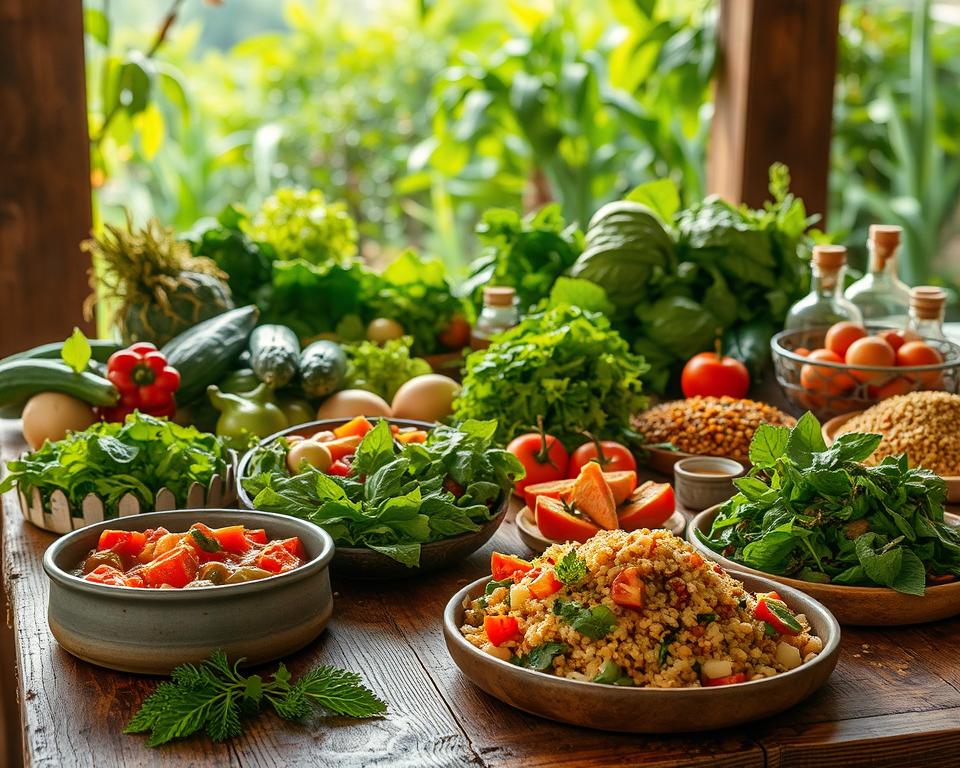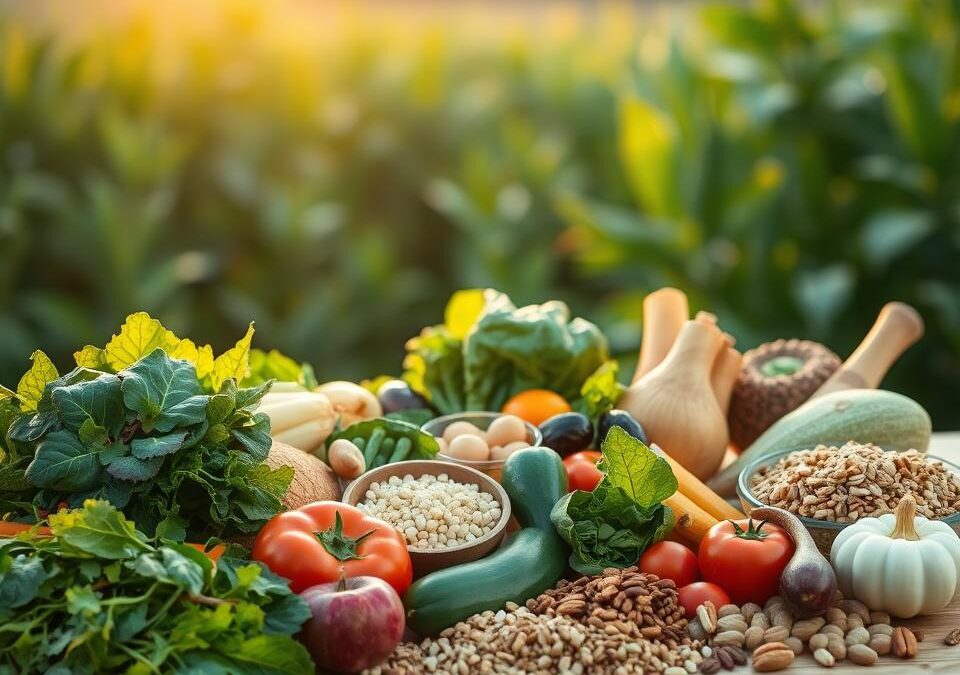Eating a plant-based diet is easy and good for your health. Adding more plants to your meals can lower disease risk and make you feel better.
A balanced nutrition plan is important. Foods like fruits, veggies, and whole grains give you the nutrients you need for good health.
Choosing the right diet benefits can help you control your health. Eating whole, nutrient-rich foods can greatly improve your well-being.
What Makes Plant-Based Eating Powerful
Plant-based eating is great for your health. It means eating foods from plants like fruits, veggies, whole grains, and legumes.
Defining Plant-Based vs. Vegan vs. Vegetarian
Plant-based, vegan, and vegetarian diets are different. Vegans don’t eat any animal products, like dairy or eggs. Vegetarians might eat dairy and eggs, depending on their diet.
Plant-based eating is about eating whole, natural plant foods. It lets you have animal products sometimes.

The Scientific Foundation of Plant Nutrition
Plants are full of good stuff like vitamins, minerals, and antioxidants. Plant nutrition is based on giving you these nutrients. It’s also low in bad fats and high in fiber.
How Plants Support Overall Health
Eating different plants helps your health. It gives you the nutrients you need and helps your gut. This can make you feel more energetic, help with weight, and lower disease risk.
Plant-Based Diet Benefits for Disease Prevention
Eating a plant-based diet is good for your health. It helps prevent chronic diseases. Eating whole, plant-based foods lowers disease risk.
Heart Disease Risk Reduction
Fruits, vegetables, and whole grains are in plant-based diets. They help lower cholesterol and blood pressure. Studies show a 30% lower heart disease risk with these foods. They improve blood and reduce inflammation.

Cancer-Fighting Properties
Plant-based diets can prevent some cancers. Antioxidants and phytochemicals in plants protect cells. Foods like broccoli and kale lower colon cancer risk.
Type 2 Diabetes Management and Prevention
Plant-based diets help with insulin and glucose. They lower the risk of insulin resistance and type 2 diabetes. Foods like whole grains and legumes are very helpful.
Improved Gut Health and Digestion
Fiber from plants is good for your gut. A healthy gut microbiome boosts your immune system. Eating different plant-based foods helps your gut and digestion.
How Plants Boost Energy and Vitality
Eating whole, plant-based foods can make you feel more energetic. It helps you feel better overall. Plants are full of nutrients that boost your energy.
Enhanced Energy and Reduced Fatigue
Plant-based diets have lots of vitamins and minerals. They fight off tiredness. Foods like leafy greens, nuts, and seeds have iron and other nutrients.
Weight Management Without Restriction
A good plant-based diet helps with weight control. It keeps you full with fiber from fruits, veggies, and whole grains. This way, you don’t overeat.
This method of losing weight is easy to keep up with.
Strengthened Immune Function
Plants are full of antioxidants and nutrients that boost your immune system. Eating lots of fruits, veggies, and other plant foods helps fight off sickness. These foods can make you less likely to get sick.
Anti-Inflammatory Effects on the Body
Many plant foods fight inflammation in your body. Inflammation can lead to heart disease and diabetes. Eating foods like berries, turmeric, and green tea can help.
Choosing a plant-based diet can make you healthier and happier.
Step-by-Step Guide to Transitioning to Plant-Based Eating
Starting a plant-based diet might seem hard. But, it’s easier with a step-by-step plan. Make small changes that work for you. This way, you can keep going without getting tired.
Step 1: Begin with Plant-Forward Meals
Start by eating more plant-based meals. Put veggies, fruits, whole grains, and legumes first in your meals. You don’t have to stop eating animal products right away. Just add more plant-based dishes to your day.
Step 2: Gradually Replace Animal Products
When you get used to plant-based meals, start replacing animal products. Start with one or two meals a day. Try a plant-based breakfast or lunch first.
Step 3: Stock Your Kitchen with Plant Staples
Having the right ingredients is key. Make sure you have grains like quinoa and brown rice, canned beans, frozen veggies, nuts, and seeds. These make it easy to cook delicious plant-based meals.
Step 4: Master Simple Plant-Based Recipes
Learning simple plant-based recipes helps a lot. Start with easy dishes like salads, soups, and stir-fries. Then, try more complex ones as you get better.
Breakfast Ideas
- Oatmeal with fruits and nuts
- Avocado toast on whole grain bread
- Smoothies with spinach, banana, and almond milk
Lunch and Dinner Options
- Quinoa salad with roasted vegetables
- Lentil soup with whole grain bread
- Grilled tofu with stir-fried vegetables and brown rice
Snacks and Desserts
- Fresh fruit salad
- Dark chocolate square
- Roasted chickpeas seasoned with herbs
| Meal Type | Plant-Based Ideas |
|---|---|
| Breakfast | Oatmeal, Avocado Toast, Smoothies |
| Lunch/Dinner | Quinoa Salad, Lentil Soup, Grilled Tofu |
| Snacks/Desserts | Fruit Salad, Dark Chocolate, Roasted Chickpeas |
By following these steps and adding more plant-based recipes to your diet, you’ll be on your way to a healthier lifestyle.
Overcoming Common Plant-Based Diet Challenges
More people are trying plant-based diets. But, they often face obstacles. Knowing these challenges and how to beat them is crucial for success.
Meeting Protein, Iron, and B12 Needs
Ensuring enough protein, iron, and B12 is a big worry. Plant-based sources like legumes, lentils, and tofu have plenty of protein. Iron is in dark leafy greens and fortified cereals. Vitamin B12 is in plant-based milk and cereals or supplements.
Dining Out and Social Situations
Dining out or going to social events can be tough. But, many places have plant-based options now. It’s okay to ask for special dishes to fit your diet.
Managing Cravings for Animal Products
Cravings can be tricky. Find tasty plant-based foods and pay attention to what you need. Trying new recipes and flavors helps a lot.
Budget-Friendly Plant-Based Shopping
Plant-based eating doesn’t have to cost a lot. Buy in bulk, choose seasonal produce, and cook at home. This makes it budget-friendly.
Conclusion: Your Path to Plant-Based Wellness
Choosing a plant-based diet is a big step towards feeling better. Eating more plants can help you avoid serious diseases. It also makes you feel more alive and strong.
Starting a plant-based life might seem hard, but it’s doable. Begin by adding more plant-based meals to your diet. Then, slowly replace animal products with plant ones.
Having the right foods at home and learning simple recipes helps a lot. This makes your journey easier.
Remember, every little change helps. Keep going and you’ll see the good changes in your health. Stay healthy and happy.


